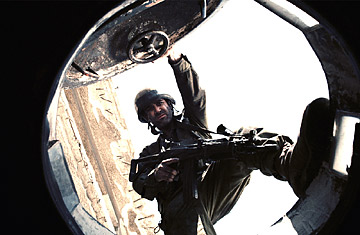
Zohar Strauss as Jamil
The films that emerged from Israel for a half-century or so after its birth were so ordinary, so mediocre, that perplexed cinephiles would jokingly say, "What? Jews can't make good movies?" Over the last few years, though, a vigorous spirit has emerged, questing and questioning, and made Israel's one of the most vital of national cinemas — up there with Romania and, in the range of its intimate dramas that strike a universal chord, an honorable successor to its antagonist Iran, which dominated worldwide festival and art-house screens in the '90s.
Many of Israel's prize-winning films, from The Band's Visit to Waltz With Bashir, take a complex approach to Arab-Israeli relations. Others, like Beaufort, are set during the Israeli-Lebanese wars — an understandable concern for a people constantly either at war or on war alert. But no other Israeli movie, and few movies from any country, focus on the hell of war with the searing intensity of Samuel Maoz's Lebanon, which won the top prize at last year's Venice Film Festival. It opens Friday Aug. 6 in New York City, the following weekend in Los Angeles and soon in other large cities.
Like Bashir director Ari Folman, Maoz served in the 1982 Israeli-Lebanon war; his film is a survivor's haunted memory of that conflict and its lingering scars. Folman's film documented the nightmares his fellow veterans suffered long after being discharged; Maoz had a more tangible memento. He has said that, while shooting Lebanon, he suffered from a feverish foot infection, only to wake up one night to find that five flakes of shrapnel had fallen from his skin — "the last testimony to the Lebanon War that my body suddenly decided to eject after 24 years."
Except for the opening and closing shots of a field of sunflowers, the entire film takes place in an Israeli tank holding four very nervous soldiers. Extreme closeups catch every bead of sweat on their faces, each drop of oozing oil from the clanky tank. The only view to the streets outside, and only one man has it, is through the gunsight aimed at insurgents and civilians. Which ones to shoot at? Which ones to save? Imprisoning the audience with the soldiers may be a gimmick, but it's an inspired one: the viewer wants both to stay inside — shielding them from harm, or from doing harm — and to get the hell out.
"Man is steel. The tank is only iron," reads a slogan painted on the inside of the tank; but these young men are not made of metal, and whatever mettle they may possess will be brutally tested. Assi (Itay Tiran), designated the leader of the group, is unready for tough decisions and eventually paralyzed by fear. The gunman, Schmulik (Yoav Donat), fires when he shouldn't, freezes up when he should — both mistakes result in fatalities — and keeps fretting about his mom back home. The loader, Hertzel (Oshri Cohen, who won the Israeli Academy Award for Best Actor as the star of Beaufort), is competent but mouthy; in a WWII movie he'd be called Brooklyn. And the driver, Yigal (Michael Moshonov), panics when he can't restart a damaged engine without the help of the team's commander Jamil (Zohar Shtrauss), who must drop into the tank frequently to get the men functioning. Two other visitors jangle the men's nerves even further: the corpse of the Israeli soldier who died because of Schmulik's mistake, and a Syrian captive (Dudu Tassa), mute observer to the horror felt by the four other scared guys — his putative enemies.
There's some editorializing with the closeups of gaunt Arab faces, a portrait of Madonna and child glimpsed in the cratered house of a Lebanese Christian family. But the horror is real and wracking. With the tank oozing oil and other liquids, the men seem to be trapped inside a monster's digestive system. Similarly, the plot may be familiar from dozens of Hollywood foxhole dramas, and the claustrophobic concentration reminiscent of the German war film Das Boot, but the treatment is original: What other movie has, as its exalting emotional climax, the spectacle of one man helping another to pee into a tin can? Lebanon works as a disasters-of-war screed, a depiction of men under impossible stress and, politics aside, a taut, agonizing thriller. You'll want to see this salutary, unrelentingly claustrophobic nightmare.
